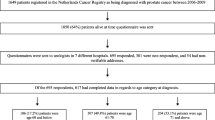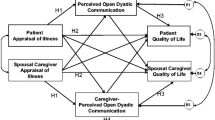Abstract
Introduction
Although prostate cancer is prevalent, little information is available on how it affects couples’ quality of life (QOL) according to their age cohort. The purpose of this study was to examine how quality of life, self-efficacy and appraisal of the illness experience vary among men with prostate cancer and their partners according to age cohort: middle age (50–64); young-old (65–74); and old-old (75–84). Using an Adult Developmental and Family Stress framework, this study focuses on how normative (developmental stage) and non-normative stressors (prostate cancer) may affect a couple's ability to adapt.
Methods
A descriptive, comparative design was used to examine age-related differences in quality of life and selected psychosocial variables in 69 men with prostate cancer and their spouses. Cross-sectional data were obtained using standardized instruments with adequate reliability and validity. ANCOVA and MANCOVA were used to determine differences among age groups.
Results
Findings indicated that patients who were ages 65–74 had better QOL and higher self-efficacy than patients ages 50–64 and less negative appraisal of illness than the other two groups. Spouses ages 50–64 reported the most distress related to sexual changes in their husbands. Spouses in both the middle age and old-old group had more bother related to hormone therapy than the young-old spouses.
Implications for cancer survivors
Findings suggest that interventions should be tailored to dyads’ developmental life stage. Younger and older prostate cancer survivors and their partners may benefit from tailored interventions designed to improve their quality of life and confidence in managing their treatment outcomes during the survivorship period.

Similar content being viewed by others
References
Jemal A, Siegal R, Ward E, Murray T, Xu J, Thun M. Cancer statistics, 2007. CA: Cancer J Clin 2007;57:43–66.
Levinson D. A conception of adult development. Am Psychol 1986;41(1):1–13.
Rowland J. Developmental states and adaptation: adult model. In: Holland J, Rowland J, editors. Handbook of psycho-oncology: psychological care of the patient with cancer. New York: Oxford University Press Inc.; 1990. p. 25–43.
McCubbin M. Family stress theory and the development of nursing knowledge about family adaptation. In: Fathom SL, et al, editor. The nursing of families: theory, research, education, and practice. Newborn Park: Sage; 1993. p. 46–58.
Baltes PB. Theoretical propositions of life-span developmental psychology: on dynamics between growth and decline. Dev Psychol 1987;23(5):611–26.
Brandtstadter J, Renner G. Tenacious goal pursuit and flexible goal adjustment: explication and age-related analysis of assimilative and accommodative strategies of coping. Psychol Aging 1990;5(1):58–67.
Newman B, Newman P. Development through life: a psychosocial approach. Belmont, CA: Wadsworth; 1999.
Baltrusch HF, et al. Psychosocial stress, aging, and cancer. Ann NY Acad Sci 1988;521:1–15.
Deimling GT, et al. Cancer-related health worries and psychological distress among older adult, long-term cancer survivors. Psychooncology 2006;15:306–20.
Rusteon T, Moum T, Wiklund I, Hanestad BR. Quality of life in newly diagnosed cancer patients. J Adv Nurs 1999;29(2):490–8.
Devins G, et al. Context moderates illness-induced lifestyle disruptions across life domains: a test of the illness instrusiveness theoretical framework in six common cancers. Psychooncology 2006;15:221–33.
Deimling GT, et al. The health of older-adult, long-term cancer survivors. Cancer Nurs 2005;28(6):415–24.
Hewitt M, Rowland J, Yancik R. Cancer survivors in the United States: age, health, and disability. J Gerontol: Medical Sciences 2003;58(1):82–91.
Cimprich B, Ronis DL. Age at diagnosis and quality of life in breast cancer survivors. Cancer Pract 2002;10(2):85–93.
Nijboer C, Triemstra M, Tempelaar R, Mulder M, Sanderman R, van de Bos G. Patterns of caregiving experiences among partners of cancer patients. Gerontologist 2000;40(6):738–46.
Bull M. Factors influencing family caregiver burden and health. West J Nursing Res 1990;12(6):758–76.
Carter PA, Acton GJ. Personality and coping: predictors of depression and sleep problems among caregivers of individuals who have cancer. J Gerontol Nurs 2006;32(2):45–53.
Schulz R, Beach SR. Caregiving as a risk factor for mortality: the caregiver health effects study. JAMA 1999;282(23):2215–9.
McCorkle R, Pasacreta JV. Enhancing caregiver outcomes in palliative care. Cancer Control 2001;8(1):36–45.
Grov EK, Dahl AA, Moun T, Fossa SD. Anxiety, depression, and quality of life in caregivers of patients with cancer in late palliative phase. Ann Oncol 2005;16:1185–91.
Kurtz M, et al. Depression and physical health among family caregivers of geriatric patients with cancer—a longitudinal view. Med Sci Monit 2004;10(8):CR447–56.
Zahn L. Quality of life: conceptual and measurement issues. J Adv Nurs 1992;17:795–800.
Krongrad A, Litwin S, Lai H, Lai S. Dimensions of quality of life in prostate cancer. J Urol 1998;160:807–10.
Eton DT, Lepore S. Prostate cancer and health-related quality of life: a review of the literature. Psychooncology 2002;11:307–26.
Hu JC, Elkin EP, Pasta DJ, Lubeck DP, Katttan MW, Carroll PR, Litwin MS. Predicting quality of life after radical prostatectomy: results from CaPSURE. J Urol 2004;171:703–8.
Litwin MS, Sadetsky N, Pasta DJ, Lubeck DP. Bowel function and bother after treatment for early stage prostate cancer: a longitudinal quality of life analysis from CaPSURE. J Urol 2004;172:515–9.
Boehmer R, Babayan RK. Facing erectile dysfunction due to prostate cancer treatment: perspectives of men and their partners. Cancer Investig 2004;22(6):840–8.
Brar R, Maliski SL, Swan L, Krupski T, Litwin M. Changes in quality of life among low-income men treated for prostate cancer. Urology 2005;66(2):344–9.
Deliveliotis C, Liakouras C, Delis A, Skolarikos A, Varkarakis J, Protogerou V. Prostate operations: long-term effects on sexual and urinary function and quality of life. Comparison with an age-matched control population. Urol Surg 2004;32(4):283–9.
Weber BA, Sherwill-Navarro P. Psychosocial consequences of prostate cancer: 30 years of research. Geriatr Nurs 2005;26(3):166–75.
Fitch M, Gray R, Franssen R, Johnson E. Men's perspective on the impact of prostate cancer: implications for oncology nurses. Oncol Nurs Forum 2000;27(8):1255–63.
Harden J, Schafenacker A, Northouse LL, Mood D, Smith D, Pienta K, Hussain M, Baranowski K. Couples’ experiences with prostate cancer: focus group research. Oncol Nurs Forum 2002;29(4):701–9.
Hedestig O, Sandman P, Tomic R, Widmark A. Living after external beam radiotherapy of localized prostate cancer. Cancer Nurs 2005;28(4):310–7.
Ward-Smith P, Kapitan D. Quality of life among men treated with radiation therapy for prostate cancer. Urol Nurs 2005;25(4):263–8.
Yang BK, Crisci A, Young MD, Silverstein AD, Peterson B, Dahm P. Cross-sectional survey of long-term quality of life after radical perineal prostatectomy. Urology 2005;65(1):120–5.
Navon L, Morag A. Advanced prostate cancer patients’ relationships with their spouses following hormonal therapy. Eur J Oncol Nurs 2003;7:73–80.
Northouse LL, Mood D, Templin T, Mellon S, George T. Couples patterns of adjustment to colon cancer. Soc Sci Med 2000;50:271–84.
Bowman KF, Deimling GT, Smerglia V, Sage P, Kahana B. Appraisal of the cancer experience by older long-term survivors. Psychooncology 2003;12:226–38.
Gray RE, Fitch M, Phillips C, Labrecque M, Fergus K. Managing the impact of illness: the experiences of men with prostate cancer and their spouses. J Health Psychol 2000;5(4):531–48.
Northouse LL, Dorris G, Charron-Moore C, Templin T, Mood D. Couples’ adjustment to breast cancer during the first year following diagnosis. J Behav Med 2001;24(2):115–36.
McPherson CP, Swenson KK, Kjellberg J. Quality of life inpatients with prostate cancer. Sem Oncol Nurs 2001;17(2):138–46.
Given BA, Given CW, Stommel M, Azzouz F. The impact of new demands for assistance on caregiving depression: tests using the inception cohort. Gerontologist 1999;39(1):76–85.
Aldwin CM, et al. Age differences in stress, coping, and appraisal: findings from the normative aging study. J Gerontol 1996;51B(4):P179–188.
Kim J, Keshian J. Old, old caregivers: a growing challenge for community health nurses. J Commun Health Nurs 1994;11(2):63–70.
Bandura A. Self-efficacy. In: Ramachaudran VS, editor. Encyclopedia of human behavior. vol 4. New York: Academic; 1994. p. 71–81.
Kurlowicz LH. Perceived self-efficacy, functional ability, and depressive symptoms in older elective surgery patients. Nurs Res 1998;47(4):219–26.
Campbell LC, et al. Prostate cancer in African Americans: relationship of patient and partner self-efficacy to quality of life. J Pain Symptom Manage 2004;28(5):433–44.
McCubbin M. Family stress theory and the development of nursing knowledge about family adaptation. Newborn Park: Sage; 1993.
Kornblith A, Herr HW, Ofman US, Scher HI, Holland JC. Quality of life of patient's with prostate cancer and their spouses: the value of data base in clinical care. Cancer 1994;73(11):2791–802.
Eton DT, Lepore SJ, Helgeson VS. Psychological distress in spouses of men treated for early-stage prostate carcinoma. Cancer 2005;103(11):2412–8.
Holicky R. Caring for the caregivers: the hidden victim of illness and disability. Rehabil Nurs 1996;21:247–52.
Given CW, Stommel M, Collins C, Kings S, Given BA. Responses of elderly spouse caregivers. Res Nurs Health 1990;13:77–85.
Northouse LL, Mood D, Montie JE, Sandler HM, Forman JD, Hussain M, Pienta KJ, Smith DC, Kershaw T. Living with prostate cancer: patients’ and spouses’ psychosocial status and quality of life. J Clin Oncol. 2007;25(27):1–7.
Cohen J. A power primer. Psychol Bull 1992;112:155–9.
Ware JJ, Kosinski M, Keeler SD. A 12-item Short-Form Health Survey: construction of scale and preliminary tests of reliability and validity. Med Care 1996;34:220–33.
Wei JT, Dunn RL, Litwin MS, Sandler HM, Sanda MG. Development and validation of the expanded prostate cancer index composite (EPIC) for comprehensive assessment of health-related quality of life in men with prostate cancer. Urology 2000;56(6):899–905.
Oberst MT. Appraisal of caregiving scale: manual for use. Detroit, MI: Wayne State University; 1991.
Lewis F. Family visitation study final report: National Cancer Institute. 1996.
Northouse LL, Mood D, Kershaw T, Schafenacker A, Mellon S, Walker J, Galvin E, Decker V. Quality of life of women with recurrent breast cancer and their family members. J Clin Oncol 2002;20(19):4050–64.
Northouse LL, Caffey M, Deichelbohrer L, Schmidt L, Guziatek-Trojniak L, West S, et al. The quality of life of African American women with breast cancer. Res Nurs Health 1999;22:444–60.
Nunnally JCBIH. Psychometric theory. 3rd ed. New York: McGraw-Hill, Inc.; 1994.
Crowe H, Costello A. Prostate cancer: perspectives on quality of life and impact of treatment on patients and their partners. Urol Nurs 2003;23(4):279–85.
Clark JA, et al. Changes in quality of life following treatment for early prostate cancer. Urology 1999;53(1):161–8.
Litwin MS, Melmed GY, Nakazon T. Life after radical prostatectomy: a longitudinal study. J Urol 2001;166:587–92.
Soloway CT, et al. Sexual, psychological and dyadic qualities of the prostate cancer ‘couple’. BJU Int 2005;95:780–5.
Litwin MS, Nied RJ, Dhanani N. Health-related quality of life in men with erectile dysfunction. J Gen Intern Med 1998;13:159–65.
Litwin MS, Shpall A, Dorey F, Nguyen T. Quality of life outcomes in long term survivors of advanced prostate cancer. Am J Oncol 1998;21(4):327–32.
Ficarra V, Novara G, Galfano A, Stringari C, Baldassarre R, Cavelleri S, Artibani W. Twelve-month self-reported quality of life after retropubic radical prostatectomy: a prospective study with Rand 36-Item Health Survey (Short Form-36). BJU Int 2005;97:274–8.
Neundorfer MM. Coping and health outcomes in spouse caregivers of persons with dementia. Nurs Res 1991;40(5):260–5.
Wallhagen MI. Caregiving demands: their difficulty and effects on the well being of elderly caregivers. Sch Inq Nurs Pract: An International Journal 1992;6(2):111–27.
Acknowledgement
This study was funded in part by a NCI grant (R01CA90739-01) to L. Northouse (P.I.).
Author information
Authors and Affiliations
Corresponding author
Rights and permissions
About this article
Cite this article
Harden, J., Northouse, L., Cimprich, B. et al. The influence of developmental life stage on quality of life in survivors of prostate cancer and their partners. J Cancer Surviv 2, 84–94 (2008). https://doi.org/10.1007/s11764-008-0048-z
Received:
Accepted:
Published:
Issue Date:
DOI: https://doi.org/10.1007/s11764-008-0048-z




